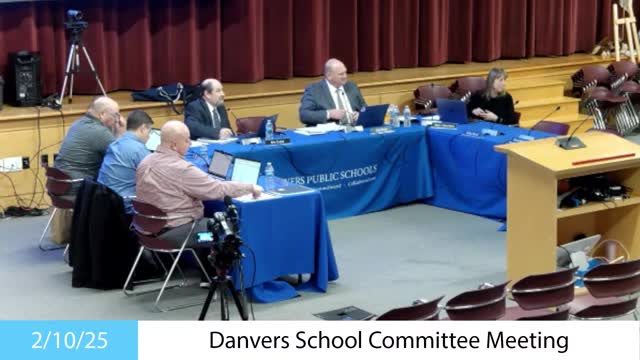Essex Tech representative: assessments rising, admissions lottery proposal would shift enrollment and budgets
Get AI-powered insights, summaries, and transcripts
Subscribe
Summary
Mr. Landers reported a preliminary 4% assessment increase for Danvers' share of Essex North Shore Vocational Technical School, described flat Danvers enrollment at Essex Tech and pushed back on a statewide push for blind-lottery admissions, citing outreach and diversity gains.
Mr. Landers, the Danvers representative to Essex North Shore Vocational Technical School (Essex Tech), presented a yearly update to the School Committee on Feb. 11. He said the district’s preliminary assessment for fiscal 2026 is expected to rise about 4% (roughly $170,000 for Danvers) and that Danvers’ enrollment at Essex Tech remains steady at 239 students from the town.
Landers said that across the 17 sending districts, some communities face assessment increases exceeding 15% and a few with larger jumps. He described the Essex Tech application cycle as competitive for Danvers students and noted that Danvers had 47 applicants this cycle (down from 53 the prior year) and that most Danvers applicants secure placement in one of their top program choices.
A central point of Landers’ update was a statewide Department of Elementary and Secondary Education (DESE) proposal to require blind-lottery admissions for some vocational districts. Landers said Essex Tech has pursued proactive outreach and nonlottery evaluation — including interviews and guidance-staff referral — to improve access for underrepresented students and argued that a blanket lottery could undo progress in districts that have deliberately diversified their rosters. He said Essex Tech’s admission process includes discretionary, subjective components (interviews and local guidance input) and that removal of those elements could have consequences for both student fit and sending-town budgets because a blind lottery might result in substantial swings in the number of students each sending town sends and thus in assessments.
Landers also outlined governance and voting-weight mechanics at the regional district: although the school committee has 21 members, votes are weighted by sending-district enrollment (he noted Danvers carries six weighted votes and Peabody 10 in the current formula). He flagged two near-term pressures for vocational districts: a personnel-driven budget increase (a new contract drove a projected 4.5% preliminary district budget increase) and a statewide push on admissions practice that he said may proceed despite local objections.
Why this matters: A change to admissions rules could shift who attends Essex Tech and how much each sending town pays; Danvers leaders will monitor the DESE debate because enrollment shifts can materially affect local assessments and long-term budgeting.
